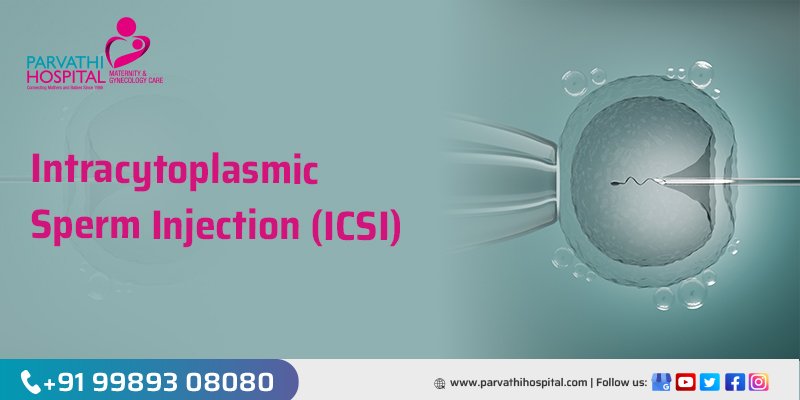Need to Know About Intracytoplasmic Sperm Injection (ICSI)

In the realm of assisted reproductive technologies, ICSI has emerged as a revolutionary technique, offering hope and solutions to couples facing various fertility challenges. Embarking on the journey of parenthood is a deeply personal and often complex experience, and Intracytoplasmic Sperm Injection has become a significant tool in the hands of experts to help fulfill this cherished dream. From understanding the procedure, itself to exploring its applications, success rates, and potential considerations, we will guide you through all you need to know about ICSI.
What is an Intracytoplasmic Sperm Injection?
The most widely used form of fertilization in assisted reproductive technology is intracytoplasmic sperm injection procedure. Its effectiveness, standardization, which makes it simple to implement into the everyday practices of fertility centers around the world, and the fact that it can be used to treat almost all types of infertility are the main drivers of its appeal. ICSI is without a doubt the best procedure for treating severe male factor infertility that cannot be treated, but its use in cases of male and non-male factor infertility is not supported by research.
Intracytoplasmic Sperm Injection Benefits
For couples struggling with male factor infertility, ICSI is a safe and successful technique that increases the likelihood of conception. Some benefits of intracytoplasmic sperm injection include:
- The sperm from the male partner is not getting to the egg.
- Numerous sperm have distorted shapes. The sperm cannot reach the egg to fertilize it if they are not shaped.
- ICSI aids in the treatment of diseases like diabetes as well as conditions like trauma that may result in premature ejaculation or the inability to achieve or maintain a normal erection.
- Male sperm can reach the egg, but for known or unknown reasons, they are unable to fertilize it.
- Men having significant sperm problems, including infertility.
- Men who have trouble with sperm development or sperm motility
- An obstruction, such as a vasectomy, that stops sperm from being released during ejaculation.
- Men who don’t have any of the problems could still be eligible for ICSI if the couple’s previous in vitro fertilization attempts failed.
- Many couples are eligible for ICSI treatment if they want to test for specific genetic issues.
- If the male spouse suffers from paralysis, a permanent vasectomy, trauma, or injury.
Intracytoplasmic Sperm Injection Risks
ICSI is a method that is generally thought to have low related hazards. ICSI does, however, have some risks and drawbacks of its own, as does every part of medicine. The male partner is not at risk from the operation after the sperm has been obtained. The only dangers are minimal and relate to the sperm retrieval techniques. ICSI risk factors include, among others:
1. Damage to the embryo
Not all fertilized eggs develop into healthy embryos. During the ICSI procedure, some eggs and embryos may sustain damage.
2. Multiple pregnancies
Couples who combine ICSI and IVF have a 30–35% higher risk of conceiving twins and a 5%–10% higher chance of conceiving triplets. The likelihood of various difficulties during pregnancy and childbirth, such as high blood pressure, gestational diabetes, low amniotic fluid levels, early labor, or the necessity for a cesarean section, increases when the mother is carrying multiples.
3. Birth defects
With a typical pregnancy, there is a 1.5%–3% risk of a serious birth defect. ICSI treatment marginally increases the likelihood of birth abnormalities, however they are still uncommon. Angelman syndrome, Beckwith-Wiedemann syndrome, sex chromosomal abnormalities, and hypospadias are a few congenital disorders linked to ICSI. A male offspring’s chance of experiencing reproductive problems also marginally rises. There is a chance that infertility could be passed genetically.
How does Intracytoplasmic Injection Work
When the egg is prepared for retrieval, the ICSI process is carried out. The steps are as follows:
Step 1: Retrieval
Either the guy ejaculates into a cup and provides a sample of sperm, or the sperm must be surgically removed. There are numerous methods for getting the sperm out. The sperm retrieval technique may occasionally be carried out sooner and freeze.
Step 2: Injection of sperm into the egg
After being recovered, a single sperm is extracted after washing the semen sample. A hollow, extremely thin needle is then used to inject this into an egg. The sperm does not have to swim through the cervical fluid because it is injected immediately. An embryo can be produced by sperm fertilizing an egg up to 24 hours later.
Step 3: Monitoring the embryo.
For up to 6 days, the fertilized embryos are housed in a lab. They are observed for signs of development and growth during this time. Not every fertilized embryo will be placed in the woman’s womb. So, selecting the healthiest and most viable embryos requires this stage.
Step 4: Transferring the embryos.
One or two embryos are chosen and transferred to the woman’s womb using an ultrasound-guided catheter once the embryo reaches a specific stage of development. This could occur two or five days after conception.
Final Words
In conclusion, delving into the realm of Intracytoplasmic Sperm Injection (ICSI) has revealed the remarkable strides that science and medicine have taken to address the challenges of fertility. As we wrap up our exploration of this intricate procedure, it’s clear that ICSI has not only provided hope but also a tangible path to parenthood for those who once faced daunting obstacles.
The journey to understanding ICSI has taken us through its meticulous process, its applications in various fertility cases, and its potential success rates. We’ve learned that this innovative technique is a testament to the resilience of the human spirit, as well as the relentless pursuit of scientific advancement.









